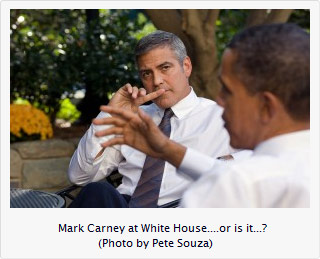 The British media is obsessed with Mark Carney, the new boss at the Bank of England, who, this week, made his first public appearance as governor with a speech in Nottingham. There were adoring comments about his looks (the vague resemblance with George Clooney, supported with plenty of photographs) and his voice (deep, confident, reassuring), and as most journalists are more in awe of money and wealth than they are willing to admit, references to his generous pay package were also not missing. But there was also consternation that the words of the ‘most talented central banker of his generation’ seemed to carry so little weight with the markets.
The British media is obsessed with Mark Carney, the new boss at the Bank of England, who, this week, made his first public appearance as governor with a speech in Nottingham. There were adoring comments about his looks (the vague resemblance with George Clooney, supported with plenty of photographs) and his voice (deep, confident, reassuring), and as most journalists are more in awe of money and wealth than they are willing to admit, references to his generous pay package were also not missing. But there was also consternation that the words of the ‘most talented central banker of his generation’ seemed to carry so little weight with the markets.
The Wall Street Journal had previously described Carney as ‘a pioneer of forward guidance’. Forward guidance is the allegedly new central bank technique of telling the market where policy will be heading (or rather, assuring the market where it will not be heading), supposedly in order to make policy more effective. Despite Mr. Carney’s repeated assurances that rates will only be moved higher when unemployment drops to a certain level (7% is Mr. Carney’s magic number) and that this will not occur until 2016, the market has recently been happily selling fixed income securities, and in the process, has allowed the forward curve to start pricing in earlier rate hikes. To Mr. Carney’s pledge to keep rates low, the market has practically been saying, in the words of the inimitable Jeffrey “The Dude” Lebowski, ”Yeah, well, that’s just like…your opinion, man.”
Whether the market will be proven right and whether rates really will move higher earlier than Carney contemplates today, is a question we cannot answer. The future will tell. (Personally, I remain of the opinion that the talk of ‘tapering’ in the US is overdone, that central banks will not manage a smooth ‘exit’ from their position of extreme accommodation, and certainly not anytime soon.) But the market is undoubtedly correct to not allow itself to be guided in its assessment of the economy’s future performance, and therefore future policy, by the BoE’s new super-bureaucrat.
The whole idea of forward guidance is, of course, preposterous. The market knows full well that policy will change if circumstances change. Should the economy recover more quickly, should the Fed’s actions put pressures on other central banks to also remove accommodation, should inflation rise faster, or should the pound come under pressure, the policy elite at the BoE will most certainly have to respond. Conversely, if the economy nosedives again or if another financial accident occurs, central bankers will cut rates again (maybe to negative levels?), and throw more money at the problem.
The market is, of course, frequently wrong in assessing the future. Also, the market’s assessment is constantly changing. But the market is still the most awesome machinery for data-collection and data-processing, and it remains unmatched by any institution, individual or group of individuals, even overpaid George Clooney lookalikes.
Most bizarre about this whole episode is the reverence with which the commentariat still treats the central bankers. Based on their exaggerated view of their own powers to do good, and their importance for ongoing growth, and based on their erroneous and self-serving belief that money-printing is costless as long as certain conveniently self-selected measures of consumer prices remain under control, central bankers have, for years, happily fed the housing bubbles and allowed bank balance sheets to balloon beyond all proportion. They then sleepwalked into the crisis of their own making, and once the house of cards had collapsed, they feverishly tried to recreate semblances of stability and solvency, usually by printing more money faster and by manipulating various asset markets through targeted purchases. Recent financial history is a legacy of central bank failure, yet the media remains uninterested in economics and obsessed with personalities. Politicians, bureaucrats and central bankers – no matter the disasters they produce, the hope persists that the next guy will do better and save the world.
Markets, however, are rather less sentimental and much less prone to political romanticism.
[Hear more: Eric Janszen: Bernanke's Departure in 2014 Could Lead to Major Market Turbulence]
In this respect, the ongoing debate about who will be the next Fed chairman, Janet Yellen or Larry Summers, is equally unenlightened and undignified. Summers strikes me as the more interesting and unpredictable thinker and he would probably make a more entertaining chairman. Nevertheless, the impact of the selection on future policy is marginal, in my view.
And one final thought: If the market is correct and economies are presently recovering with more momentum, than this is most likely the result of reflationary monetary policy finally gaining traction and of accelerating credit growth. In that case, prices won’t stay still. (As an aside, farmland in the US keeps appreciating at double-digit clips.) Inflation and inflation expectations could quickly be on the rise. If that is indeed the case, and if central bankers then keep sitting on their hands because of their forward-guiding commitments, the bond market could continue to be in trouble.
The potential for central bankers to do harm remains bigger than that to do good.
Source: Paper Money Collapse






